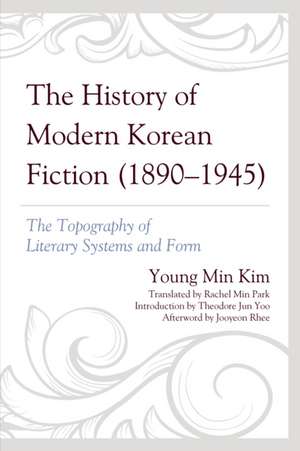The History of Modern Korean Fiction (1890-1945): Critical Studies in Korean Literature and Culture in Translation
Autor Young Min Kimen Limba Engleză Paperback – 11 mai 2022
| Toate formatele și edițiile | Preț | Express |
|---|---|---|
| Paperback (1) | 367.38 lei 6-8 săpt. | |
| Lexington Books – 11 mai 2022 | 367.38 lei 6-8 săpt. | |
| Hardback (1) | 778.18 lei 6-8 săpt. | |
| Rowman & Littlefield – 8 noi 2020 | 778.18 lei 6-8 săpt. |
Preț: 367.38 lei
Nou
Puncte Express: 551
Preț estimativ în valută:
70.30€ • 72.98$ • 58.62£
70.30€ • 72.98$ • 58.62£
Carte tipărită la comandă
Livrare economică 24 martie-07 aprilie
Preluare comenzi: 021 569.72.76
Specificații
ISBN-13: 9781793631916
ISBN-10: 1793631913
Pagini: 330
Dimensiuni: 152 x 229 x 19 mm
Greutate: 0.54 kg
Editura: Lexington Books
Colecția Critical Studies in Korean Literature and Culture in Translation
Seria Critical Studies in Korean Literature and Culture in Translation
ISBN-10: 1793631913
Pagini: 330
Dimensiuni: 152 x 229 x 19 mm
Greutate: 0.54 kg
Editura: Lexington Books
Colecția Critical Studies in Korean Literature and Culture in Translation
Seria Critical Studies in Korean Literature and Culture in Translation
Notă biografică
Young Min Kim is director of the Center for Modern Korean Studies and professor in the Department of Korean Language and Literature at Yonsei University.
Descriere
Descriere de la o altă ediție sau format:
This book traces the emergence of modern Korean literature and its trajectory towards the turn of the twentieth century. In examining the entanglements of literary style, form, and contemporaneous institutions, Young Min Kim illuminates an oft-overlooked period in modern Korean literary history.
This book traces the emergence of modern Korean literature and its trajectory towards the turn of the twentieth century. In examining the entanglements of literary style, form, and contemporaneous institutions, Young Min Kim illuminates an oft-overlooked period in modern Korean literary history.



